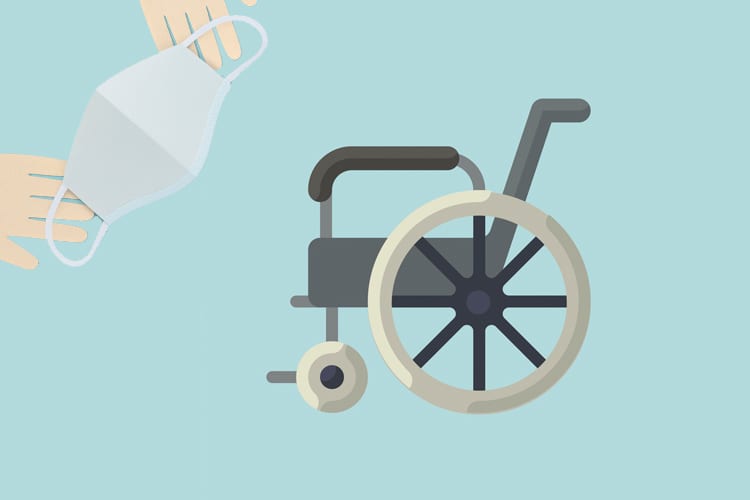Getting Masks to the Disabled Community and How To Help

On Thursday, July 16, a total of 3.5 million COVID-19 cases were confirmed in the country with 11 states at the highest risk level they’ve ever been.
They are Florida, Arizona, Louisiana, South Carolina, Alabama, Texas, Georgia, Nevada, Tennessee, Mississippi, and Idaho.
It should come as no surprise then that the nation is now moving towards mandating masks for Americans. However, that mandate comes from a state level. Currently, about half of the country require their residents to do so.
Regardless if your state is currently mandating or not, make it a personal choice to protect yourself, your family, and your community. Simply by wearing a mask or face-covering in public spaces with no political association can help save lives.
Most people would consider purchasing a mask and running errands a normal occurrence. But what about those that are disabled and can’t afford or get access to them?
Masks for the Disabled Community and their Personal Assistants
If your state has programs for aging and disability communities, they could have a distribution plan for masks, gloves, and hand sanitizer similar to Portland’s program.
However, if you do not have access to your local aid network and cannot participate in in-person pickups, there is an organization called MyDiversibility. They have a grassroots level #Masks4Disability project that provides contact-less delivery or shipment of masks. Specifically for disabled Americans and their personal assistants that need them!
You would just need to fill out this Google form to request. Know someone that can benefit too? Go ahead and send them the form rather than filling it out for them due to personal information being provided.
Personal assistants are also important to stay protected as they manage their patient’s daily tasks. This includes grooming, meals, housekeeping, emotional support, and even accompany them to work. It’s particularly helpful for those that are mobility, sight, or hearing-impaired.
Who is Exempt from Wearing a Mask?
First, there is no such thing as a “face mask exemption card.” Some were buying this fake card as a means to justify not wearing a mask.
The CDC states that those under the age of 2 are exempt. “Anyone who has trouble breathing, or is unconscious, incapacitated, or otherwise unable to remove the mask without assistance” are also included.
However, this has led to non-disabled people to claim that they have trouble breathing with a mask. There is currently no official guidelines on who is exempt but the following individuals might not be able to wear a mask:
- People with asthma, COPD, or other respiratory disabilities. Consult with your doctor on advice for mask-wearing.
- People with PTSD, claustrophobia, or severe anxiety may be terrified of the mask
Autistic people that may be extremely sensitive to touch and texture as the mask covering can cause sensory overload (Here’s more information on how to address this) - Those with cerebral palsy can fall into the category of not being able to put on/take off a mask without assistance
- Those who use mouth control devices
How You Can Help the Disabled Community
If you’re able, consider contributing face masks to the #Masks4Disability project or donate to assist in their administrative overhead, shipping costs, and material cost to create more reusable masks.
You could also find a local organization that might need more masks or assistance.
If you have the ability to sew, that’s another great option to use some of your free time. Help those in need in your spare time!










